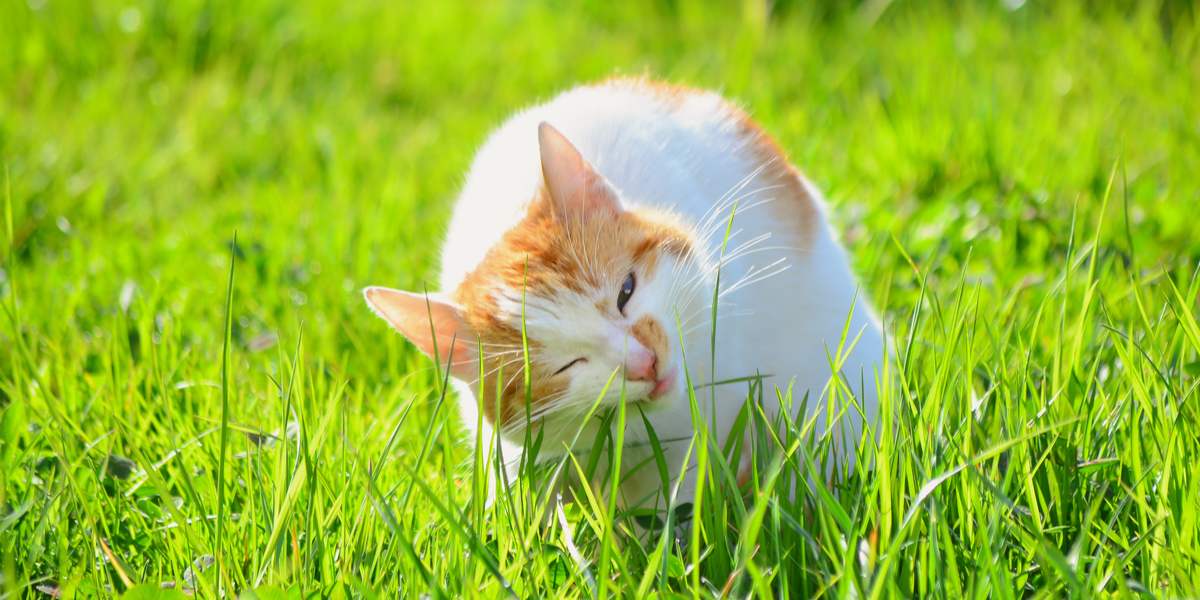
Cats are quirky creatures with many curious habits, but one odd behavior that has long puzzled cat lovers is why cats eat grass. Although cats that go outdoors obviously have more access to the green stuff, even indoor cats will nibble on blades of grass if they go outside for some fresh air or to explore. So why is this? Let’s take a look.
There are many theories on why cats eat grass. Grass eating is a normal cat behavior and is generally harmless. While eating grass is harmless for cats, take special care to keep chemically treated grass and plant matter away from your pets.Key Takeaways
Why Do Cats Eat Grass and Throw Up?
Cats are obligate carnivores, which means they are biologically designed to eat a primarily meat-based diet. Although cats can digest grains, fruits, and vegetables found in commercial cat food, cats are not true omnivores.
This means that plant material like grass would not be part of their diet in the wild.In fact, grass does not necessarily agree with a cat’s digestive system since some cats that eat grass promptly throw it up a short while later, along with hair and other indigestible materials. The reason this happens is that cats do not have the required enzymes required to properly digest it.
So why does a cat eat grass?
Theories About Why Cats Eat Grass
The answer to this question has eluded scientists for ages, but a recent study may have gotten to the bottom of this feline idiosyncrasy. Before we get to that, let’s recap some of the long-held theories about why cats eat grass.
- Nutritional boost: One theory suggests that cats eat grass because they are lacking certain nutrients or enzymes in their diet. Grass does contain folic acid, but the jury is out on the idea that cats intuitively know that they need a top-up on folic acid.
- Upset stomach relief: Cats sometimes vomit after consuming grass. Another theory about why cats eat grass says that cats know they will throw up after a grass snack, so if they ate something that did not agree with them or they are otherwise feeling unwell, they might attempt to induce vomiting by eating grass.
- Natural laxative: It’s possible that eating grass helps ease constipation or aid in hairball removal. Grass contains a lot of fiber, so it could get things moving in the right direction.
A New Theory About Why Cats Eat Grass and Added Benefits
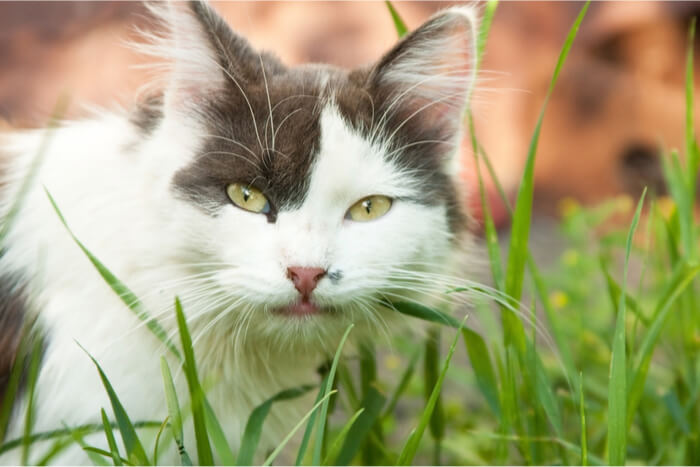
Cats are carnivores and don’t possess the natural enzymes necessary to digest a lot of plant material.
Recently, researchers at the University of California, Davis, School of Veterinary Medicine conducted an online survey of more than 1,000 cat owners asking about their cats’ penchant for eating grass and plants. The findings, presented in the summer of 2019 at the annual meeting of the International Society for Applied Ethology in Bergen, Norway, revealed some interesting facts about cats eating grass.
First, eating plant material is very common. 71 percent of cats in the study nibbled plants at least six times in their life, and 61 percent ate plant material at least 10 different times.
Another finding was that most cats (91%) were acting normally and did not appear to be sick in the time immediately preceding the grass eating. Of all the cats that ate plant material, only about 27 percent frequently vomited after eating it.
Based on these results, the researchers hypothesized that cats don’t eat grass as a way to naturally treat an upset stomach. Instead, scientists believe that cats possibly eat grass and other plant matter instinctually in order to rid themselves of intestinal parasites. This is a behavior observed in wild carnivores and primates. Eating vegetation might trigger the digestive tract to physically expel troublesome parasites.
Is Grass Safe for Cats and How Much Cat Grass Should a Cat Eat?
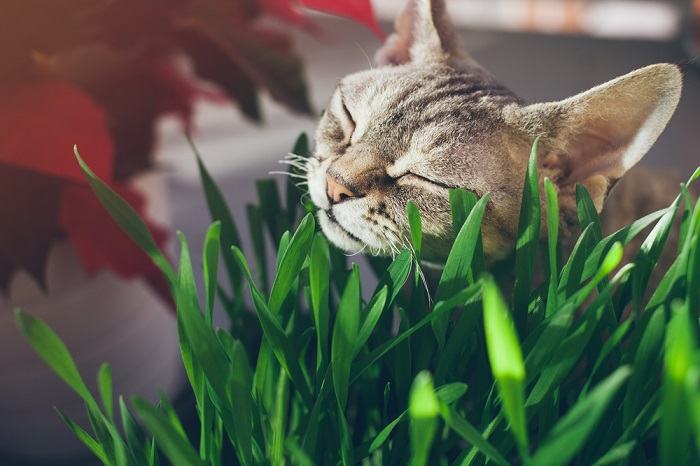
Cat grass (sometimes called kitty grass) is a safe grass blend meant to be grown indoors.
Whatever the reason, many cats do eat grass on occasion. Some cats even eat grass every day. But do you need to be concerned if your cat nibbles on it now and again?
The answer to that question is yes and no.
Eating grass can cause mild stomach upset, which is why some cats vomit after eating grass. Grass in and of itself is not generally dangerous to cats. In fact, the right type of grass is even a safe and nutritious snack for cats.
However, the danger comes from what might be on the grass your cat is consuming. Lawn fertilizer, weed killer, pesticides, and other chemicals used on lawns can be very dangerous to your cat, even in small amounts.
Also Read: Cat Grass: What It Is, How To Grow It, And More
What To Do if Your Cat Eats Grass
If your cat eats grass in your yard, keep an eye on them to make sure they aren’t displaying any signs of illness. This is especially important if you use any chemicals on your lawn like fertilizer, herbicides (weed killer), or pesticides.
If your cat throws up after eating grass, make note of how many times they vomit.
Call your veterinarian if they keep throwing up, or if they are displaying other symptoms like diarrhea, lack of appetite, lethargy, seizures, tremors, foaming at the mouth, or any other signs of illness.
Eating Other Plants and Flowers
Although grass is not dangerous for cats to eat, other plants are very toxic to cats. Cats that like to eat grass might also try to munch on houseplants and flowers, which can have deadly results.
Some plants cause mild issues in cats like mouth irritation or stomach upset; others can cause severe vomiting and diarrhea, seizures, kidney failure, and death.
Many plants and flowers are toxic to cats, but some of the most dangerous include all types of lilies, autumn crocus, azaleas, rhododendrons, oleander, cyclamen, and daffodils. Keep only non-toxic plants, greenery, and flowers in your home.
If you suspect your cat may have eaten part of a toxic plant or flower, or even just licked water from the vase of a dangerous plant, contact your veterinarian or an animal poison-control hotline right away.
How Cats Can Eat Grass Safely?
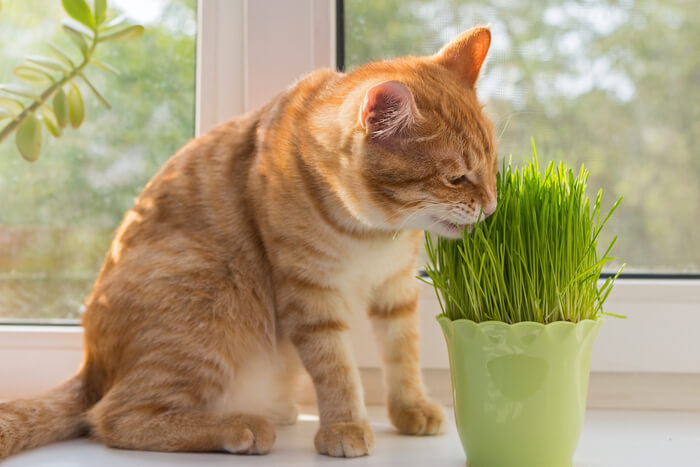
Cat grass is easy to grow and safe for cats to eat.
If your cat likes to eat grass, but you’re worried about them consuming dangerous lawn chemicals, purchase special grass for your cat to safely snack on. Cat grass (sometimes called kitty grass) is a safe grass blend grown indoors.
Lightly water the grass container, put it near a window for indirect sunlight, and let it sprout. Your cat will love munching the grass that grows, and you can rest easy knowing it doesn’t contain any dangerous chemicals.
Also Read: 10 Herbs That Are Toxic to Cats (And 7 That Are Safe)
Final Thoughts
While we are not completely certain why cats eat grass from time to time, it’s a perfectly normal and common thing for cats to do. Don’t let your cat munch on grass treated with chemicals, such as pesticides and fertilizers.
Educate yourself on the types of plants and flowers that are toxic to cats. Purchase some cat grass to grow indoors, so your cat can snack on it without any worries. If your cat has eaten chemically treated grass or toxic plants, call animal poison control and/or your veterinarian immediately.
Frequently Asked Questions
Is eating grass bad for cats?
Cats can't really digest grass, so eating grass can cause mild stomach upset and vomiting. However, grass is not generally dangerous to cats. Still, cats can become very sick from eating any grass treated with lawn fertilizer, herbicides (weed killer), pesticides, or other chemicals.
Why is my cat eating grass?
No one knows the true reasons cats eat grass, but some theories say that cats eat grass to relieve an upset stomach, to obtain nutrients lacking in the diet, to ease constipation or move hairballs through the intestinal tract, or to purge their bodies of intestinal parasites.
Do cats eat grass when they are sick?
A recent study suggests that cats don’t eat grass if they are sick. However, eating grass can cause a cat to suffer mild stomach upset, including vomiting.
How often should cats eat cat grass?
Cats can nibble on cat grass as often as they like, and many owners leave trays out for their cats to visit as they desire. If you notice that your cat is eating too much grass and suffering from excessive stomach upset, you can limit her grass consumption to just a few times a week.
Does cat grass make cats vomit?
Cats sometimes vomit after consuming grass. One theory is that cats eat grass because they know that eating it will cause them to throw up. They do this because they already have an upset stomach, and inducing vomit may help them feel better afterward.
Do cats eat grass when they have worms?
Some scientists believe that cats eat grass and other plant matter to rid themselves of intestinal parasites—a behavior that has been observed in wild carnivores and primates. Eating vegetation might trigger the digestive tract to physically expel troublesome parasites.



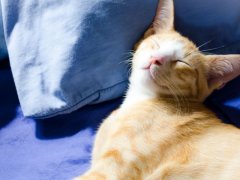
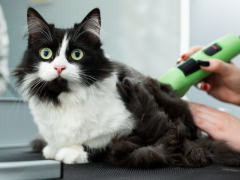



My cat eats lots of grass outside around my flower garden! and I have seen her twice go to her litter and drag out poop with a whole blade of grass and then rub he bum on the bathroom floor, as that’s where her litter is! Is this normal due to the long blade of grass or does she have worms, because she also eats house flies!
Hi Shirley, it’s very difficult to say why your cat is scooting after going to the bathroom, but given the information you’ve provided, it does sound very likely that she’s trying to clean off the blade of grass and anything that was stuck to it. Home examination and a trip to the vet can tell you whether or not she also has worms. Wishing you all the best!
Hi,
I have another possibility as to why cats might eat plants, grass in particular. Our two cats like to gnaw on one particular plant in our neighbor’s front yard. When I see them do it, it makes me think they are using it as dental floss. This plant isn’t a grass but some sort of miniature palm (I think) with very narrow leaves. They don’t even seem to be consuming it, though undoubtedly they swallow some of it.
Paul
Thoughtful! Thanks for the idea.
I was a little disappointed by this discussion. I was hoping that science would have progressed further in pinpointed the causes of grass-eating in cats by now. But, as a biologist who has been doing cat rescue with many, many cats in the past 40 years, I have a theory. I think that the purge-of-irritants theory is probably at least one of the most valid explanations (but, I won’t reject the search-of-nutrients theory, or the search-for-roughage theory). I think that the hypotheses in the discussion may be suffering from the “horses vs. zebras” phenomenon (if you hear hoofbeats in North America, it is far more likely that they are caused by horses than zebras). The discussion addressed sources of irritation such as parasites but left out the most common and prevalent source of stomach irritation in housecats: hairballs. While hairballs will alone induce vomiting, they can be very difficult to eliminate. I’ve seen many cases of “scarf-and-barf”, where severe hairball accumulation cause so much vomiting that the cat just can’t hold anything down. You wonder how they can receive any nutrition. Yet, most of these vomits are unproductive–i.e., they do not eject any hairballs. Sometimes, they get so concentrated that they form a dense, large, hard mass. I think that cats may use grass as an emetic—to induce vomiting to aid the elimination of hairballs, even in cases where hairballs are not severe enough to cause severe vomiting. They may use it as a “tonic” for less severe cases, or even to prevent buildup of hair in the stomach. It would be better if they would tell us why they do it. I’ve asked my cats many times why they do it. They are not very revealing.
Thanks for your thoughts and insights!